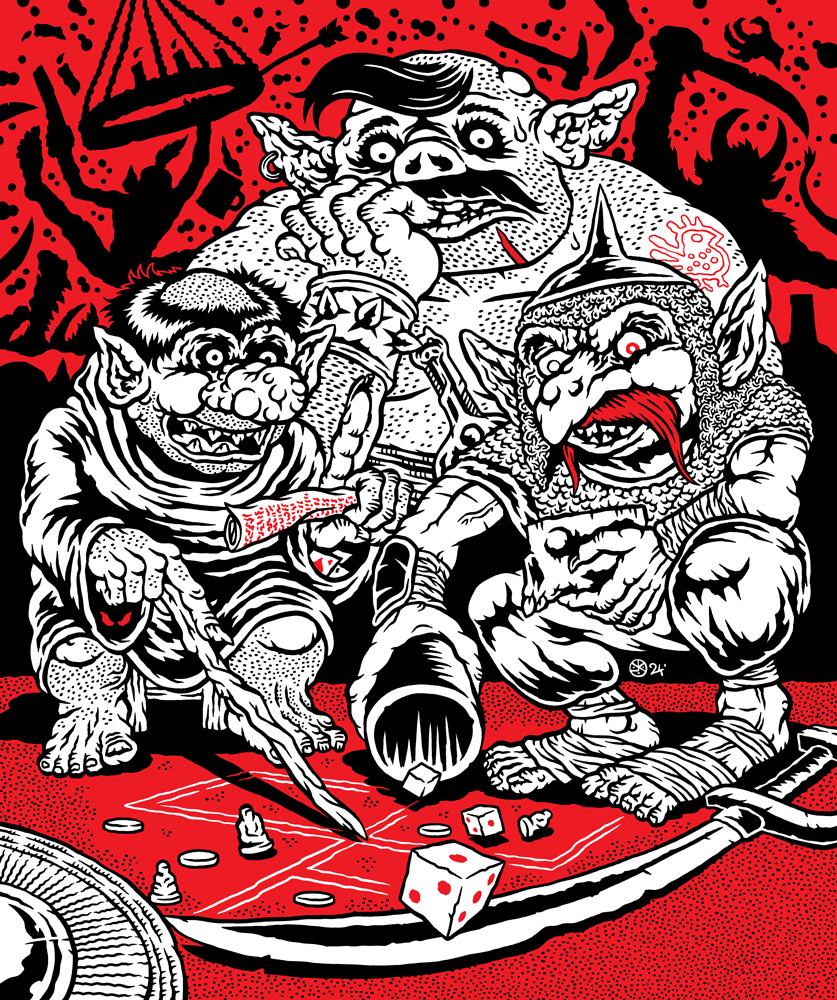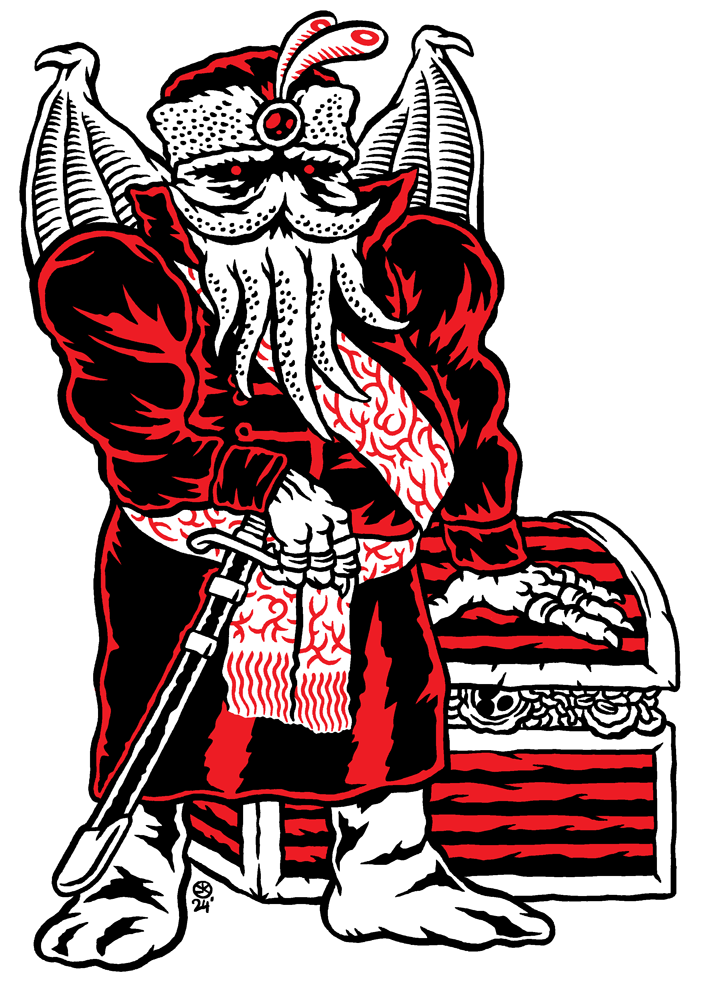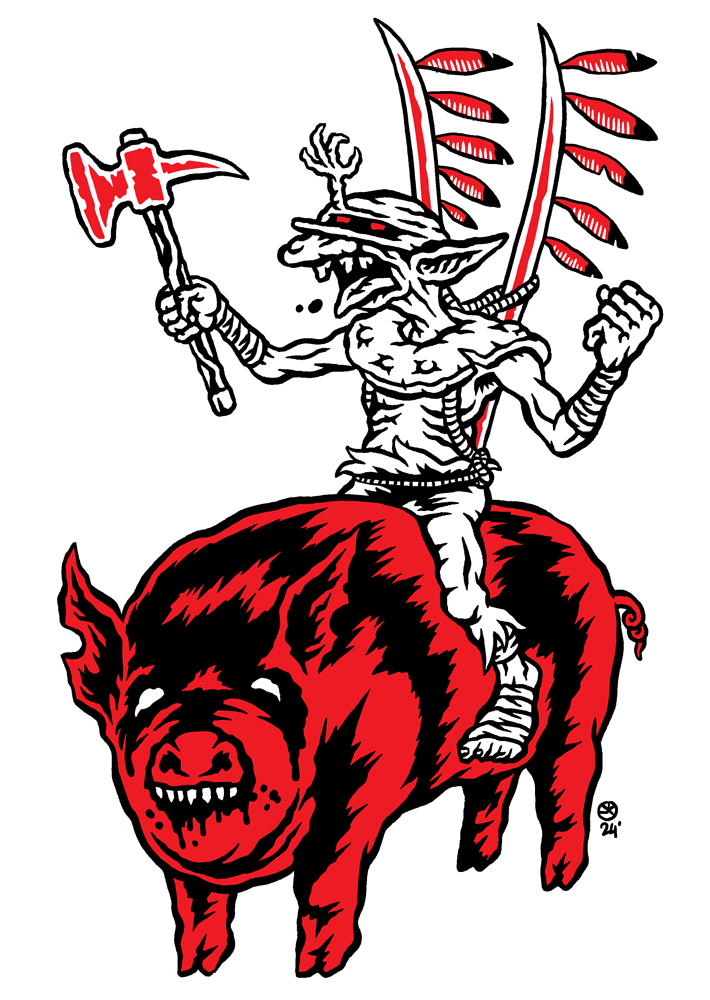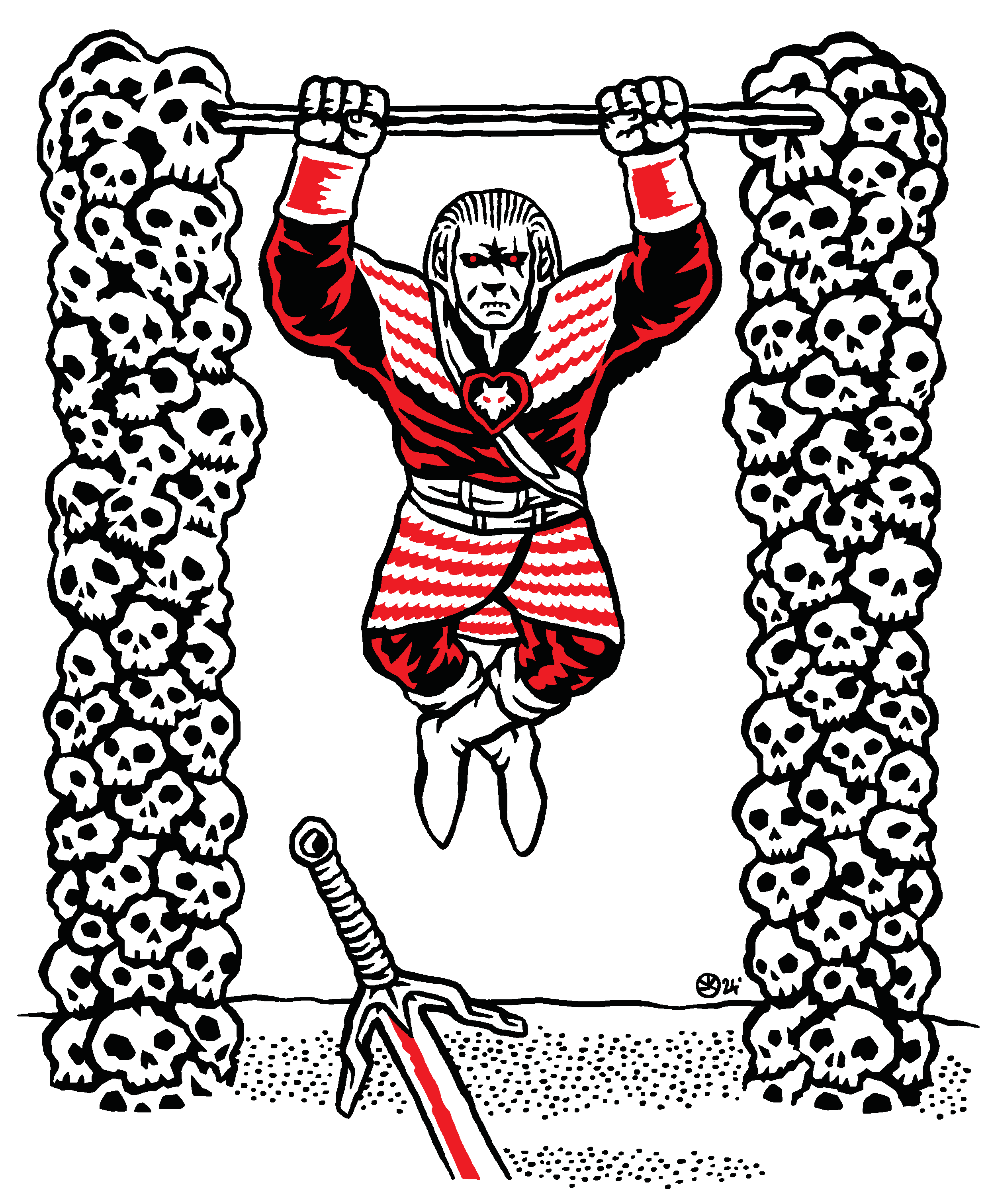Polish Your Dice
Our voyage of discovery around the world continues as we go on a tour of the trials and tribulations of Poland RPG’s scene with Tomek Kreczmar (with more than a little help from Marcin Segit)
Our voyage of discovery around the world continues as we go on a tour of the trials and tribulations of Poland RPG’s scene with Tomek Kreczmar (with more than a little help from Marcin Segit)

Whether it’s the hit series of computer games based on The Witcher books, or award winning board games like Detective: A Modern Crime Board Game, Polish games are today known around the world. Still, whilst many involved, such as The Witcher’s lead writer and story director Marcin Blach and Ignacy Trzewiczek, co-creator of Detective, began their careers writing for RPG magazines it is only in the last few years that Polish RPGs themselves have begun to make a name for themselves beyond our borders.
To understand why that might be we should first offer up a brief reminder of our country’s recent history. Until the last days of the 1980s Poland sat on the “wrong” side of the Iron Curtain. Poles had to fight not only for freedom but even just the ordinary things of life. With everything from food to toilet paper rationed and the ever present shadow of government censorship, fantasy tabletop games, unsurprisingly perhaps, ranked low on many people’s priorities.
Equally importantly for most Poles travel to the West was simply impossible. whilst those few who could visit then hit an economic barrier. With the average 1980’s Polish worker’s wages up to thirty time less than an American’s those who were travelling abroad generally weren’t bringing home tabletop games.
Still, for all that some who made it abroad did prefer games to washing powder or Walkmans and these imported titles were soon put to good use. As the 80s gathered pace pirated copies of foreign games began to circulate, often bootleg versions of popular SPI or TSR games and mainly produced by a company called Encore. Indeed in 1984 it was Encore who did finally publish the first fantasy games in Poland, the groundbreaking board game Labirynt śmierci, known internationally as The Citadel of Blood, and Bitwa na polach Pelennoru, a pirated version of the Tolkien themed war-game Gondor.
Pirate releases like these were not unusual in Poland, indeed back then Poles were busy bootlegging everything from otherwise unavailable technology to otherwise unavailable Star Wars figures, VHS movies and much more besides. This phenomenon led to an important part of Polish culture, what we called the "Third Circuit”. Where the “First Circuit” consisted of publishers approved by government censors, and the “second” underground publishers tied to political opposition movements, “third circuit” publishers were often associated with specific subcultures, such as music scenes or science fiction and fantasy novels.
Importantly for our story it was via this "Third Circuit" that Poles were able to not only access literature then unavailable in bookshops, but also discover new tabletop games. A good example was Warsaw’s Groteka club who, in the early 1980s, distributed unlicensed Polish editions of several foreign games such as Książę, originally Machiavelli from 1977, and Ave, a translation of the Wargames Research Group’s 1972’s Decline and Fall of the Roman Empire.
Intriguingly from these clubs we also have reports of an original socio-political simulation game called Andia. Intended for between 8 and 36 participants, though sometimes played by up to 80 people, it was run by four people who acted as kind of Game Masters, and contemporary accounts brings to mind a combination of RPG and LARP. Due to their nature the circulation of these "Third Circuit” publications was small, often 1000 copies at most, and irregular so information spread slowly, still it was from these clubs that the Polish RPG scene would begin to emerge.

By the time of Labirynt śmierci’s release word of RPGs had begun to spread by word of mouth, and the first glimpses of RPGs began to appear not only in “Third Circuit” fanzines like SFera but also in the official press, introducing them to a wider audience. Magazines like Razem and Fantastyka, the most important title for science fiction & fantasy at that time, would become central to the developing Polish RPG scene and where most Polish gamers learnt both about and how to play these games.
One of the key figures was Jacek Ciesielski, through whose articles in Razem we learned both basic RPG gameplay concepts such as character creation, what a session looks like and what "nobody's creatures", as Ciesielski called NPCs, were. Indeed in August 1984 Ciesielski published in Razem an article introducing his own somewhat basic dungeon crawler, Władca Podziemi (Lord of the Dungeons). Władca Podziemi, consisted of a setting, introduced the concept of an endless game, and provided an example of gameplay but still it was a poor substitute for what was available abroad then with no coherent mechanics, recognisable character classes or functional level advancement.
Still in the absence of actual rule books Ciesielski was instrumental in presenting new ideas to the Polish scene, for example it was his famous Gra fantazji article in Razem’s November 86 issue that he first described, among other things, many of the rules of Dungeons & Dragons. Whilst in other issues Ciesielski introduced games such as Traveller, Ghostbusters, Tolkien's Middle-Earth Role-Playing and Warhammer Fantasy Role-Play, later to be the first RPG rule book officially published in Poland.
At the same time, whilst more limited in readership than the likes of Razem, the third circuit continued to play its part. From its first issue in 1984 SFera had featured a section, written by Marek Penszko, called Fantasy Games. And it was here in 1986 that another important early game in our history, W podziemnym labiryncie (In the Underground Labyrinth) appeared. Resembling a gamebook, and treated by many unaware recipients as such, W podziemnym labiryncie was actually an abridged translation of one of the single-player adventures included in Frank Mentzer III’s 1983 Basic D&D set.
Fragmentary as these articles often were, for many of us they were our first contact with RPGs, or what we called gry fabularne, roughly plot games, story games or narrative games. Taking these rough outlines we’d add to them in our homes, creating our own rules or even adapting those of available board games like Labyrint Śmierci. The result was that the Polish RPG scene developed with a strong DIY nature but shaky financial foundations, something that would often come back to haunt us in later years.
Still, as the 1980s drew to a close, more coherent systems did start to appear. In the spring of 1990 what is probably the first complete, if still simple, Polish RPG system, Oko Yrrhedesa (Eye of the Yrrhedes), appeared in the third issue of a new magazine Fenix. Oko Yrrhedesa was written by someone who would have an outsized influence on the history of Polish games, Andrzej Sapkowski, the author of The Witcher novels, which by then were already well known in Polish fantasy circles.
Sapkowski’s article Role Playing Games – gry fantasy dla każdego (Role Playing Games - fantasy games for everyone), started by introducing the idea of RPGs before describing Oko Yrrhedesa’s gameplay. The issue promised further scenarios and rules expansions would soon follow in the Biblioteczka Feniksa (The Fenix Library) but these never appeared and it would be another four years before Sapkowski's game eventually returned in a complete form.

The 1990s were the beginning of great change in Poland with free elections, the opening of borders and the end of censorship, accompanied by huge economic problems. Still as the 1990s got under way Poles were fascinated with newly accessible Western pop culture. With restrictions lifted publishers rushed to catch up on fantasy and science fiction literature, VHS rental stores sprung up, Marvel and DC comics finally came out and global hit films were appeared in cinemas only a few months, rather than years, after their Hollywood premieres.
Meanwhile in the tabletop game world companies like Encore and Sfera began to publish even more international games, some officially, others less so. One of the most notable was Magia i Miecz (Sorcery and Sword), otherwise known as Games Workshop’s Talisman. The first officially licensed famous board game published in Poland, Games Workshop even wrote about it in White Dwarf, boasting of this unprecedented foray behind the Iron Curtain. Indicative of many of the problems the Polish scene would face though by 1993 the economic situation meant Magia i Miecz’s license wasn’t renewed. True to from though Sfera promptly released their own cloned version, simply re-titled Magiczny Miecz (Magical Sword).
Despite the country opening up official RPGs were still both difficult to obtain and very expensive. Whilst original books were much respected, even copies of copies were of great value and photocopiers would run hot 24 hours a day. at conventions. Getting hold of books wasn’t the only problem though, even dice had to be imported. But just like in the days of Gygax and Arneson, Polish players adapted, ransacking board games or making use of cards with numbers printed on them, no substitute for real polyhedrals but still...
Finally though in 1993, a major breakthrough occurred with the the launch of Magia i Miecz, the first Polish magazine entirely devoted to RPGs. MAG, the company behind the publication, saw it as a way to properly build a Polish scene and do so around their own RPG Kryształy Czasu (Crystals of Time), a game with roots in the 80s and a group of AD&D fans who developed their own setting inspired by the fantasy literature (mostly Third Circuit), and few pirated VHS movies then available.
With little else to include Magia i Miecz divided Kryształy Czasu’s rules across its first issues and fans had to wait patiently for each, very slowly released, issue to piece the game together. Whilst it still proved popular, the truth was Kryształy Czasu was in now way ready to be released as a proper standalone rulebook and, despite some interesting innovations and helping to grow the scene, it would be another 5 long years before this genuine homegrown Polish game would be properly published.
As a result the Polish RPG market would come to be focused around an international title instead when in 1994 MAG acquired the license to publish a Polish edition of Warhammer Fantasy Role-Play. Despite the poor quality, the manual tended to fall apart after a few hours of reading, and the small number of supplements released, WFRP was to Polish RPGs what D&D was in 1970’s America.
In its wake translations of other well known games like Call of Cthulhu, Cyberpunk 2020, Middle Earth Role-Playing, Vampire: The Masquerade and Werewolf: The Apocalypse followed. The latter two especially developing a following but still hampered by poor distribution, slow release schedules and the lack of additional supplements none, not even AD&D’s second edition, could compete with WFRP in mid-1990s Poland.

Whilst these translations of international titles helped grow the scene, the quest for a truly important Polish RPG continued.
MAG revived Sapkowski’s Oko Yrrhedesa, with Magia i Miecz writers, Jacek Brzeziński and Andrzej Miszkurka, expanding the system. Aligning the game’s graphic design with that of the now extremely popular Witcher books, it sold well enough though failed to reach beyond existing gamers. 1995 also saw the release of games like Aphalon, a classic fantasy RPG that was unable to compete with WFRP and Zły Cień: Kruki Urojenia (Evil Shadow: Ravens’ Delusions), a game set in either Early Medieval Poland or in the fantastic land of Ardalonne. Ill-thought-out and poorly written, Zły Cień offered some interesting, innovative solutions for the times but today is at best considered a curiosity.
The first game to really make an impact was Dzikie Pola (literal translation Wild Fields or wilderness, the historical term for the steppe in present-day Eastern and Southern Ukraine and Western Russia). Despite being set in the Polish-Lithuanian Commonwealth from the second half of the 16th century till the 18th century Dzikie Pola did include fantastic elements, such as magic, but related them to old Polish customs and legends and featured several classic Polish folks devils, such as Boruta and Rokita. With a group of committed fans, Dzikie Pola spawned two additional supplements, a first in the history of Polish RPGs, and in 2005 a second edition.
And what of Kryształy Czasu who MAG had originally pinned their hopes on? Finally released, both too late and too early, in 1998. Its fans had moved on to more sophisticated games whilst not enough time had passed to ensure the kind of nostalgia that led to the OSR movement in the 00s. A single expansion was announced, but never officially saw release.
Despite WFRP’s dominance as the decade drew to a close MAG lost the license to publish the game. Whilst it would take a couple of years for the impact of that to be seen on the market it did have one immediate effect, forcing MAG to find another flagship system. Eventually settling on Greg Gorden’s Earthdawn, MAG introduced it to Polish gamers through a combination of articles and short stories in Magia i Miecz, a brochure with the basic rules sent to magazine subscribers and, soon after publishing a core rulebook, novel, and an adventure. It was a unique approach at the time in Poland and, whilst it never quite replaced WFRP in players' hearts, a successful one.
Despite WFRP’s absence as the new millennium dawned the Polish gaming market appeared to be quite dynamic. Call of Cthulhu, The World of Darkness games and Cyberpunk 2020 continued to gain in popularity and were joined by the likes of Shadowrun, Deadlands, Legend of Five Rings and Fading Suns. Even more experimental games, such as Frankenstein Faktoria, The Extraordinary Adventures of Baron Munchausen, and De Profundis found an audience in Poland.
On the homegrown front, hopes turned to Andrzej Sapkowski’s Witcher novels. Whilst still mostly unknown outside Poland, and with CD Projekt Red’s first video game still years away, the books were so popular at home that Polish filmmakers decided to film both a movie and a TV series based on them.
To capitalise on the buzz MAG published what would be the first official RPG set in the world of Geralt, Wiedźmin: Gra wyobraźni (The Witcher: A Game of Imagination).Sadly the film was a flop (especially compared to The Fellowship of the Ring released the same year), and the TV series was somehow even worse. Wiedźmin too fell short of its potential. The core rulebook sold well, the first supplements appeared quite quickly and a magazine, Biały Wilk (White Wolf) was published too but strong initial sales failed to translate into sustained success.
In 2002 WFRP preeminent position was finally filled with the release of D&D’s third edition. Helped in no small part by the recent success of the Polish localisation of the first Baldur's Gate computer game, which also helped establish CD Projekt, its beautiful hardcover core rulebooks and multiple supplements were snapped up by Polish gamers, who at long last got to play in the worlds of Dragonlance and Forgotten Realms, that had previously only been available as novels. With access to the largest distribution networks D&D’s 3rd (and later 3.5) edition would dominate the first decade of the 21st century and even a second edition of WFRP couldn’t shift it from its new throne.
Still, its success did mean more people playing RPGs in Poland, and with that new publishers sprung up and more Polish creators were encouraged to publish their own games. Portal Publishing House released two well received titles, Neuroshima and Monastyr. The former set in a post-apocalyptic, mid-21st century United States reduced to a barren nuclear wasteland after a war with an Artificial Intelligence. The latter a dark, cloak and dagger fantasy set in Dominion where the players were disgraced noblemen trying to become heroes once again. Copernicus Corporation published Klanarchia (Clanarchy), a richly illustrated, full colour hardcover set in a Dark Sun like post-apocalyptic fantasy world where people are beginning to rebuild and defend new communities from monsters and demons.
Possibly most ambitious was Wydawnictwo Imperium’s Crystalicum, a fantasy role-playing game with elements of magical space travel and presented in a manga style. Much like Spelljammer players voyaged across the Known Universe in sail ships powered by the solar wind. The RPG was to be just one part of the large-scale project that would also include card games, board games, wargames and fiction. However, of these only CrystalicuM: Crystal Card Game and the novel Znany Wszechświat (Known Universe) were published.
Finally though a system did appear that caught the attention of foreign publishers, Artur Ganszyniec and Maciej’s Sabat Wolsung: Magia Wieku Pary (Wolsung: Magic of the Steam Era). A steampunk RPG where players take on the role of members of high society, not always on the right side of the law, but still heroes who would often find themselves on the front pages of newspapers. Wolsung was the first major Polish role-playing game published in the USA when it was picked up by Studio 2 Publishing. Premiered at Gencon 2012 the English version was nominated for the Best Writing award at the ENNIES. The RPG was followed by a Wolsung board game in Poland, and then Wolsung Steampunk Skirmish Game, a miniatures wargame that raised over $100,000 on Kickstarter.

As around the world D&D’s 4th edition would prove to be less-than-successful in Poland. With its natural successor, Pathfinder not yet translated into Polish and games like Savage Worlds, DeadLands Reloaded and Dark Heresy unable to win over a big enough audience momentum began to ebb. An unsuccessful attempt to relaunch the magazine Magia i Miecz felt like the last straw. Whilst the crowdfunding campaign for the return of Poland's first gaming magazine was extremely successful, what eventually reached its readers was poor. Without a strong publisher in the market, more and more people felt like RPGs were over in Poland.
But then in 2018 something extraordinary happened, Black Monk Games who’d previously published a Polish edition of Steve Jackson’s Munchkin, launched a well-prepared, well organized crowdfunding campaign for a new Polish edition of Call of Cthulhu. One of the first RPGs to have appeared in Poland it still had fans, but after an unsuccessful 6th edition and the failure of Magia i Miecz no one expected a success.
Thankfully they were wrong. The campaign hit its target in under 24 hours and ultimately raised nearly a quarter of a million Euros. Call of Cthulhu’s success opened the floodgates. A translation of D&D’s 5th edition was soon followed by WFRP’s 4th, Vampire, Mothership, Conan, The One Ring, ALIEN, a new The Witcher RPG and more. And, just as important as these translations have been to the rebuilding of the Polish RPG scene, Kickstarter also provided Polish creators direct access to foreign markets for the first time.
In the years since Polish indie studios have raised tens of thousands of Euros and found an eager global audience. Dark Rabbit’s much anticipated Thorgal: The Roleplaying Game, based on the comic books series by Pole Grzegorz Rosiński and Belgian Jean Van Hamme, will be released this year simultaneously in Polish, English and French. Whilst Defiant, by Katarzyna and Marcin Kuczyński, an urban fantasy game about a secret war between fallen angels, demons, ancient gods and dragons raised nearly €70,000 and is now distributed worldwide by Magpie Game, the US publisher of the record breaking Avatar Legends RPG.
As importantly many of these new games also make the most of their Polish identity and heritage to create distinctive, unique settings that offer a fresh take on European fantasy and sci-fi for international audiences to experience. Games like Beyond Corny Groń [see Hit Points p.96] which delights with its traditional linocut illustrations and is deeply rooted in the folklore, myths and legends of Poland, Slav Borg which transports MÖRK BORG to a post-Soviet fantasy Poland where joyriding goblin gangs rule shattered streets, or SibirPunk a dystopian RPG based on the acclaimed ‘Slav Punk’ novels of Polish writer Michał Gołkowski.
After decades of false starts the Polish RPG scene is stronger, and more diverse, than it has ever been. The oppression of the 80s, economic adversity of the 90s and wasteland of the 10s has given way to a new sense of belief. Where Polish RPG creators were often forced to move sideways into computer or board games, pathways now exist to build real careers in roleplaying games. Perhaps Poles joined this race a bit later than others but as we’ve shown with the success of our computer game studios and award winning board games, given half a chance we can conquer roleplaying games too and there’s every chance that we might just be working on your next favourite game right now.
This feature originally appeared in Wyrd Science Vol.1, Issue 6 (August '24)